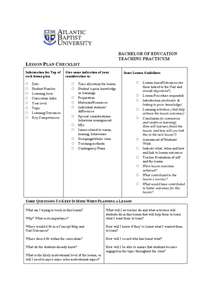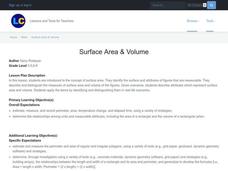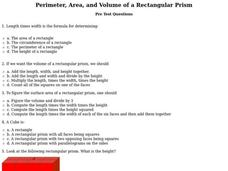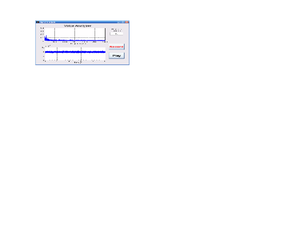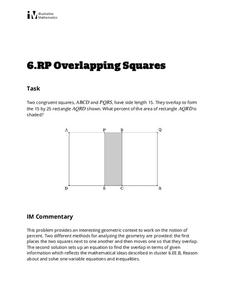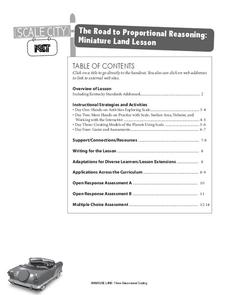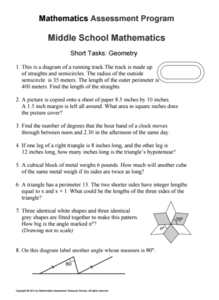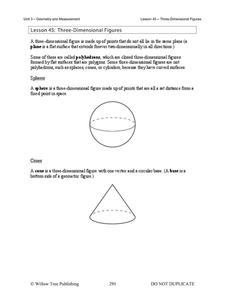Curated OER
Living in a Geometrical World
Learners participate in a series of hand-on, online, and multimedia activities to examine 2 dimensional and 3 dimensional shapes. They describe common geometric solids. They construct rectangular prisms using straws and ribbon.
Curated OER
Rounding Decimals
Fourth graders engage in a lesson that is about the concept of rounding decimals. They review place value and focus it upon the practice of rounding. Students use 10 base decimal grids or models to help make connections with the skill.
Curated OER
Surface Area and Volume
Upper graders identify the surface area and attributes of figures that are measurable. They estimate, measure, and record perimeter, area, temperature change, and elapsed time, using a variety of strategies. They also determine the...
Curated OER
Writing Takes Shape!
Students read The Greedy Triangle and discuss geometric solids. In this geometry lesson, students list the geo-solids in the world and create a graphic organizer to show where geo-solids exist.
Curated OER
Many Ways to Represent Our Data
Demonstrate several ways to represent data with your class. They will use surveys to gather data and display the data using tally charts and graphs. Then answer questions according to the data.
Curated OER
Perimeter, Area, and Volume of a Rectangular Prism
Upper elementary and middle schoolers answer ten mutliple choice questions by applying the formulas for finding the area, perimeter, and volume of a rectangular prism.
Curated OER
Compound Inequalities and Graphing
Put geometry skills to the test! Learners solve compound inequalities and then graph the inequalities on a coordinate plane using their geometric skills. They identify the slope and y-intercept in order to graph correctly. I like this...
Curated OER
Measuring Yourself Using the Metric System
Students measure using the metric system. In this geometry instructional activity, students solve problems using grams, meters and liters. They convert between the US units of measurements and the Metric System.
Curated OER
Applying the Pythagorean Theorem to find Distances Between Cities
Young scholars solve problems using the Pythagorean Theorem. In this geometry lesson, students identify the Pythagorean Triple and use it to solve real life problems.
Curated OER
Multiplication Strategies - A Day at the Zoo
This is an amazing 33-page resource for teaching multiplication! Your mathematicians will discover the connection between multiplication and repeated addition. They also will work collaboratively with arrays while studying zoo animals....
Curated OER
Multiplication Magic
Investigate multiplication problem solving strategies by working with base 10 blocks. Learners decompose problems with a Merlin the Magician theme. Multiple resources are provided.
Curated OER
Multiplication: Bugs Can Multiply, So Can I!
Develop multiplication skills with your class. Youngsters will visualize multiplication as repeated addition. Then they will create a multiplication bug book and discover arrays as a strategy for multiplication problem solving....
American Statistical Association
Exploring Geometric Probabilities with Buffon’s Coin Problem
Scholars create and perform experiments attempting to answer Buffon's Coin problem. They discover the relationships between geometry and probability, empirical and theoretical probabilities, and area of a circle and square.
Illustrative Mathematics
Box of Clay
What happens to a volume when you scale the dimensions of a rectangular prism? In this problem, a box of clay is increased in each dimension, with the intent to see if learners can generalize the result. The addition of...
Illustrative Mathematics
Tossing Cylinders
Everyone loves a lesson that involves throwing things around! To understand probability, your experimenters will predict how different cylinder-shaped objects will land when tossed. When the data is collected, they will calculate the...
Illustrative Mathematics
Overlapping Squares
The objective of this activity is to find the percent of the area of a two squares overlapping. Mathematicians find the ratio of area for the part that overlaps to the rectangle formed. The final answer is a percent as a rate per 100....
National Security Agency
Equations and Expressions
Learners demonstrate their knowledge pictorially, concretely, and abstractly in this unit meant to last three hours over three days. Using hands-on activities, manipulatives, real-world applications, and problem...
Curated OER
Board Game: Race to 100
Who can get to 100 first?! It may be in the hands of chance, but either way kids will have to practice counting and adding along the way. Partners take turns rolling two dice and moving their game pieces that many spaces until one pupils...
Curated OER
The Metric System
Applying this metric worksheet, mathematicians will provide standard metric units of measurement, identify the largest and best way to measure items using the metric system, and convert units using King Henry.
Math in English
3-D Shapes
Young mathematicians look at five 3-D shapes and name them based on the accompanying image. For each shape, learners state the number of faces, vertices, and edges.
Kentucky Educational Television
The Road to Proportional Reasoning
Just how big would it really be? Young mathematicians determine if different toys are proportional and if their scale is accurate. They solve problems relating scale along with volume and surface area using manipulatives. The...
Mathematics Assessment Project
Geometry
Help learners find joy in facing mathematical challenges. The questions posed on this worksheet encourage young mathematicians to utilize skills learned throughout a geometry unit, and to apply themselves and persevere through...
Willow Tree
Order of Operations
It's the classic please excuse my dear aunt sally strategy to remembering the order of operations. Young mathematicians practice to develop an understanding of the order of operations. Examples and practice problems include...
Willow Tree
Three-Dimensional Figures
Time to move into the third dimension! Learn the names of the geometric solids and count faces, edges, and vertices. Then learn to recognize nets that create a given solid.



